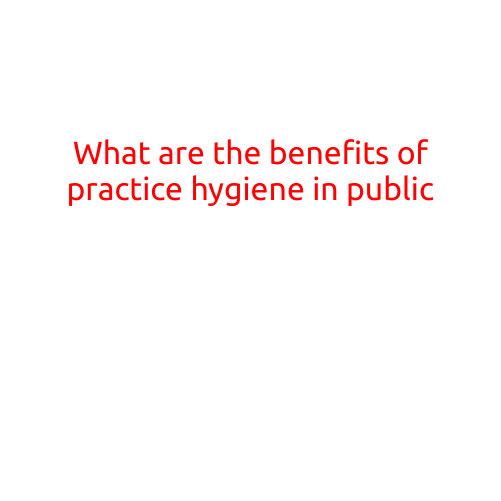
What are the benefits of practicing good hygiene in public?
In today’s fast-paced world, it’s more important than ever to prioritize good hygiene practices in public. From crowded public transportation to busy restaurants and markets, we’re constantly surrounded by people, surfaces, and objects that can potentially spread germs and illness. By practicing good hygiene in public, you can significantly reduce your risk of getting sick and contribute to a healthier community.
1. Reduced risk of illness
Good hygiene practices, such as washing your hands frequently and using hand sanitizer, can greatly reduce your risk of getting sick. In fact, the Centers for Disease Control and Prevention (CDC) estimates that frequent handwashing can prevent up to 80% of respiratory and gastrointestinal infections.
2. Protection of vulnerable individuals
Older adults, young children, and people with compromised immune systems are more susceptible to illness. By practicing good hygiene, you can help protect these vulnerable individuals from getting sick.
3. Prevention of the spread of diseases
Good hygiene practices can help prevent the spread of diseases like the common cold, flu, and even more serious illnesses like COVID-19. By covering your mouth and nose when you cough or sneeze, for example, you can prevent the spread of respiratory droplets that can carry germs.
4. Increased confidence
When you practice good hygiene in public, you can feel more confident knowing that you’re taking steps to protect yourself and others. This confidence can also translate to other areas of your life, boosting your overall well-being.
5. Better for your health
Good hygiene practices can also have a positive impact on your physical health. By washing your hands regularly, you can reduce your risk of skin infections, eczema, and other skin conditions. Additionally, good hygiene practices can help prevent the development of chronic conditions like diabetes and heart disease.
6. Reduction of germ transmission
Germs can be transmitted through touch, breathing, and even eye contact. By practicing good hygiene, you can reduce the transmission of germs and prevent the spread of illness.
7. Encouragement of public health measures
When we practice good hygiene in public, we set a positive example for others to follow. By modeling good hygiene practices, we can encourage others to do the same, creating a culture of health and wellness in public spaces.
Simple ways to practice good hygiene in public
So, how can you incorporate good hygiene practices into your daily life? Try these simple tips:
- Wash your hands frequently with soap and water, especially after using the bathroom and before eating
- Use hand sanitizer when soap and water are not available
- Cover your mouth and nose when you cough or sneeze with a tissue or your elbow
- Avoid touching your face, especially your eyes, nose, and mouth
- Keep your nails clean and short to prevent the spread of germs
- Avoid sharing personal items like lip balm, straws, or food
By prioritizing good hygiene practices in public, you can contribute to a healthier community and protect yourself and others from illness. Remember, good hygiene is simple, yet powerful, and can have a significant impact on your overall health and well-being.





